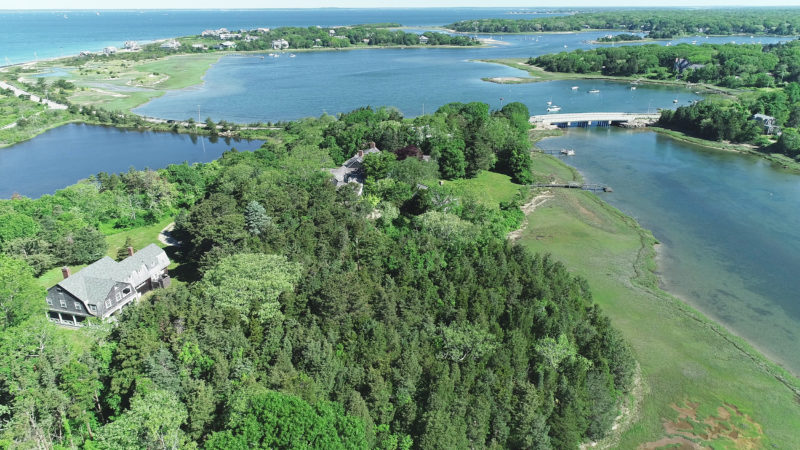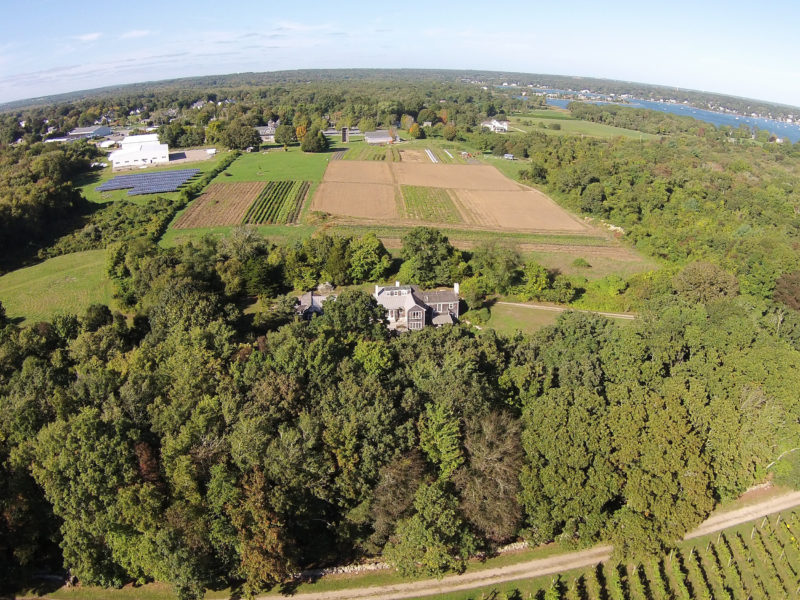Help us protect two amazing properties on West Falmouth Harbor and Dartmouth’s Apponagansett Bay
One of the Coalition’s main strategies for protecting clean water is to prevent natural land from being developed. The plants and soil on undeveloped land remove pollution from a number of sources, acting as one of the best natural filters for water flowing to Buzzards Bay.

By maintaining this waterfront property as a single-home estate, the Coalition and The 300 Committee can help control nitrogen pollution to West Falmouth Harbor.
The Coalition is currently working to protect three properties near two of the Bay’s valuable waterways that hold habitats important for clean water, and which are at risk of being further developed. Yet because they hold existing houses, these parcels require not only traditional conservation, but also resale of the homes.
The Coalition and local partners are seeking private buyers for these lands who share a dedication to protecting their natural resources. Buyers will have full ownership of the properties, and can use them for certain agreed-upon activities, such as sustainable farming. However, each of the properties will also be protected by a legal land protection agreement known as a conservation restriction. The conservation restriction will ensure that these lands can never be subdivided, and that they won’t be overdeveloped into multiple home sites.
In West Falmouth, the Coalition is collaborating with The 300 Committee Land Trust to sell a home on 9 acres of woods and wetlands along West Falmouth Harbor. This classic shingle-style summer home, located at 102 Chapoquoit Road, includes 840 feet of frontage on the harbor. Brackish ponds and wetlands connected to Great Sippewisset Marsh lie to the south and east, and a beautiful salt pond and dunes lay along Buzzards Bay to the west.
This area is a haven for sailing, swimming, fishing, and beautiful natural scenery. However, for the past 25 years West Falmouth Harbor’s health has steadily worsened due to nitrogen pollution, which clouds the water and allows clumps of slimy green algae to grow along the shoreline. As a result, the harbor’s shellfish beds and eelgrass groves — a favorite home for fish — have largely vanished.
By maintaining this waterfront property as a single-home estate, the Coalition and The 300 Committee want to help control the greatest source of nitrogen pollution to West Falmouth Harbor: septic systems. Even properly functioning septic systems cause pollution problems, as they don’t remove nitrogen from wastewater. Limiting the construction of new septic systems on this property can prevent more nitrogen pollution from entering the harbor, while also preserving the natural filter than its woods and wetlands provide.

The two properties for sale in South Dartmouth are ideally located amidst other protected lands, helping create a network of protection along Dike Creek and Apponogansett Bay.
In South Dartmouth, the Coalition is working with the Dartmouth Natural Resources Trust to protect two properties on Bakerville Road. The first, located at 205 Bakerville Road, includes a historic farmhouse and complex of four supporting barns and farm buildings, plus 21 acres of farm fields with excellent soil that will be open to agricultural operations. The second, at 227 Bakerville Road, is an expanded antique home with extraordinary privacy, nestled in the center of farmland and forest.
These two parcels are ideally located amidst other protected lands. They are both near Dike Creek, a salt marsh-lined stream that flows into Apponogansett Bay. And in coordination with these home sales and protecting the land around them, the Coalition and DNRT will also preserve 75 additional acres of forest and wetlands along the water, which will be accessible to the public through new trails. Together, these protected lands will help expand a growing network of conservation land in the area, providing a protective buffer that keeps pollution from washing into Apponagansett Bay and Buzzards Bay beyond.
These properties offer homebuyers a unique opportunity to become part of a larger effort to preserve Buzzards Bay’s waterways. They are available without a broker fee for a limited time. If you are interested in purchasing these properties and helping to conserve these special corners of your Bay, please contact Brendan Annett at (508) 999-6363, ext. 214.